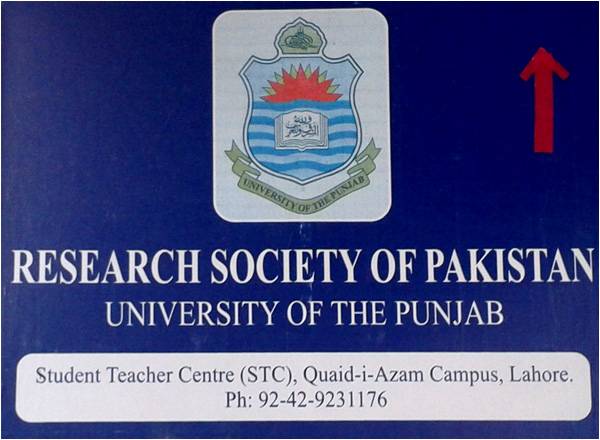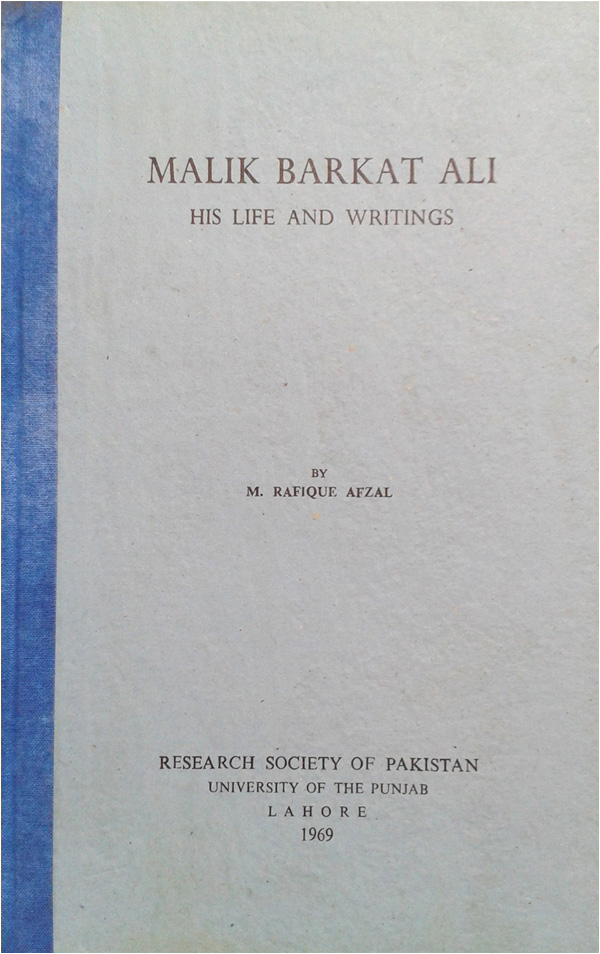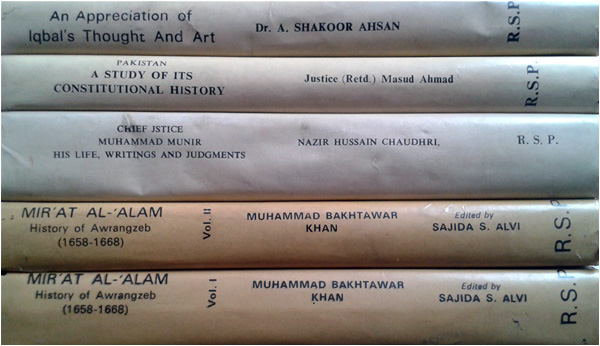
I recently acquired secondhand a large number of old books published by the Research Society of Pakistan in the 1970s and 80s. This organization, a part of the University of the Punjab, did some valuable work in publishing analytical and biographical material related to Partition and its aftermath. Examples of books I acquired were: Muslim Women's Role in the Pakistan Movement, by Sarfaraz Hussain Mirza, Birth of Pakistan- Step by Step, by Syed Qamarul Ahsan, Jinnah-Linlithgow Correspondence (1939-1943), and Speeches of Chaudhri Muhammad Ali in the Constituent & National Assemblies of Pakistan (1952-58).
Such books often contain primary source material which is invalauble to the historian or to the serious student of history, so obtaining the phone number of the R.S.P. from their somewhat bare website, I contacted them in order to find out what other titles they might have. I was invited to their office at the University of the Punjab's New Campus in Lahore, and the following afternoon paid them a visit.

At this point it would be prudent to mention something about the origins and development of the R.S.P., their purpose, significance, and so on. Unfortunately, the gentlemen of the Society don't seem to be very interested in promoting either themselves or their research. When I asked them for a copy of their catalogue, they were unable to provide it, and told me that everything was online. When I pointed out that their website consisted largely of blank space, they promised to send me a catalogue by post if I e-mailed them my mailing address. This I duly did, only to be sent the following message: "sorry.ur.send.me,mobile,no,then.i think.about". Somewhat bemused, I complied with this request and received a blank message in return.
Perhaps I should have taken the hint, but desirous of having a copy of the catalogue, I called them. After a couple of days I managed to get through to the man in charge and was told that the catalogue had been posted to me but had eventually been returned to them. I was then asked to re-send my address. This I did, and a week later a rather amateurish (but useful) sheaf of papers arrived.

It is unfortunate that an organization such as the R.S.P. is little-known outside select research circles. But what is disappointing is that when given the opportunity for free positive publicity (for I had told them that I wished to write about them so that their work is better-known), the organization's managers demonstrated avoidable incompetence and mild paranoia. Repeated attempts to contact the Society in order to elicit information for this article resulted in naught.
I came away from my visit to the R.S.P. with a couple of good books, including the historian K. K. Aziz's mammoth Ameer Ali- His Life and Work (they also had available Aziz's A Bibliography of Islamic Art). None of the books in the R.S.P. publications list costs more than Rs.1000, and most are cheaply priced in the low hundreds of rupees. In addition, these prices are subject to hefty discounts. The staff were welcoming and friendly enough, but long-distance communication seems to be problematic for them. Thus, those wishing to go through the R.S.P.'s catalogue of almost 100 Urdu and English publications and pick up back issues of the Journal of the Research Society of Pakistan, are advised to visit the STC building at the University of the Punjab's New Campus on weekdays before 4 PM.
Kabir Babar is an antiquarian and bibliophile who discusses books at www.facebook.com/KabirBabarSPQR
Such books often contain primary source material which is invalauble to the historian or to the serious student of history, so obtaining the phone number of the R.S.P. from their somewhat bare website, I contacted them in order to find out what other titles they might have. I was invited to their office at the University of the Punjab's New Campus in Lahore, and the following afternoon paid them a visit.

At this point it would be prudent to mention something about the origins and development of the R.S.P., their purpose, significance, and so on. Unfortunately, the gentlemen of the Society don't seem to be very interested in promoting either themselves or their research. When I asked them for a copy of their catalogue, they were unable to provide it, and told me that everything was online. When I pointed out that their website consisted largely of blank space, they promised to send me a catalogue by post if I e-mailed them my mailing address. This I duly did, only to be sent the following message: "sorry.ur.send.me,mobile,no,then.i think.about". Somewhat bemused, I complied with this request and received a blank message in return.
Perhaps I should have taken the hint, but desirous of having a copy of the catalogue, I called them. After a couple of days I managed to get through to the man in charge and was told that the catalogue had been posted to me but had eventually been returned to them. I was then asked to re-send my address. This I did, and a week later a rather amateurish (but useful) sheaf of papers arrived.

It is unfortunate that an organization such as the R.S.P. is little-known outside select research circles. But what is disappointing is that when given the opportunity for free positive publicity (for I had told them that I wished to write about them so that their work is better-known), the organization's managers demonstrated avoidable incompetence and mild paranoia. Repeated attempts to contact the Society in order to elicit information for this article resulted in naught.
I came away from my visit to the R.S.P. with a couple of good books, including the historian K. K. Aziz's mammoth Ameer Ali- His Life and Work (they also had available Aziz's A Bibliography of Islamic Art). None of the books in the R.S.P. publications list costs more than Rs.1000, and most are cheaply priced in the low hundreds of rupees. In addition, these prices are subject to hefty discounts. The staff were welcoming and friendly enough, but long-distance communication seems to be problematic for them. Thus, those wishing to go through the R.S.P.'s catalogue of almost 100 Urdu and English publications and pick up back issues of the Journal of the Research Society of Pakistan, are advised to visit the STC building at the University of the Punjab's New Campus on weekdays before 4 PM.
Kabir Babar is an antiquarian and bibliophile who discusses books at www.facebook.com/KabirBabarSPQR

